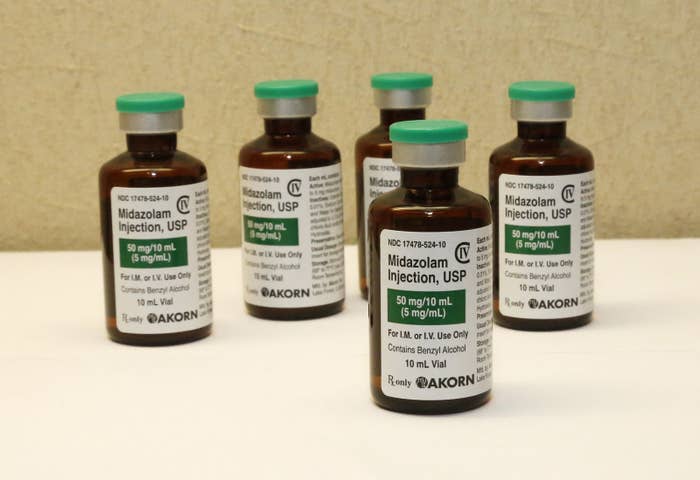
The Arizona Department of Corrections agreed this week to never again use a controversial drug implicated in several botched executions over the past few years, leaving the state without an available method to perform executions, at least for now.
The last time the state used the sedative drug midazolam, which is similar to valium, inmate Joseph Wood took nearly two hours to die in 2014 — gasping and heaving on the gurney. It took so long that Wood's attorneys had time to have an emergency hearing with the judge to discuss calling off the execution. But before a consensus could be reached, Wood died.
After the Wood execution, the state hired a private company comprised of former corrections officials to assess what went wrong and what should be changed. The company did a cursory comparison of different execution protocols and came to no determination about what actually went wrong.
The report found that the drugs "should be an effective option," and Arizona kept midazolam as an option to use in the future.
Like other states, Arizona had intended to use midazolam, followed by a drug that paralyzes the inmate, and then a drug that stops the heart — but feels like fire coursing through the veins. This was the method used in a recent prolonged execution in Alabama that took 35 minutes, with the inmate heaving, coughing and clenching his fists through the process.
Death row inmates and medical experts have argued that midazolam is not adequate to anesthetize the inmates to the pain they would feel from the other two drugs.
After a lengthy court battle between several Arizona death row inmates and the state, the department of corrections relented.
"ADC will never again use midazolam, or any other benzodiazepine, as part of a drug protocol in a lethal injection execution," according to the joint stipulation filed Monday.
This is the first agreement by a state to forswear the use of the controversial drug. If Arizona goes back on its agreement, the state opens itself up to paying millions in attorneys' fees to the inmates' counsel, and could be ordered to not use the drug.
“The state’s decision to never again use midazolam is a sensible one," Dale Baich, a federal public defender said in a statement.
"Scientific evidence shows that this class of drugs is not an appropriate drug for use in lethal injection executions. Time after time, midazolam has failed to keep condemned prisoners adequately anesthetized and to bring about a quick, humane death. The bungled execution of Ron Smith in Alabama on December 8 is just the latest example."
Although Arizona and the inmates came to an agreement on midazolam, the inmates' lawsuit continues over other issues in how the state carries out executions.
Abandoning midazolam leaves Arizona with few options. The state could attempt to find a source of pentobarbital — which is used in busy death penalty states like Texas, Missouri, and Georgia — but states have found the drug very difficult to obtain. Drug makers have taken steps to keep their products out of the hands of death penalty states.
Last year, the Arizona Department of Corrections attempted to purchase 1,000 vials of another drug called sodium thiopental from a supplier in India. A BuzzFeed News investigation found the supplier was not all he claimed to be. The drug is also illegal to import into the United States, and the Food and Drug Administration seized the shipment at the airport.
As BuzzFeed News reported, Arizona has hired a powerful law firm to argue that the FDA should release the drugs. So far, the FDA has not backed down, and the matter could be headed to court.
Arizona's only other options would be to propose a new execution drug or method, opening itself to more legal battles, or to hold off on executions altogether.
